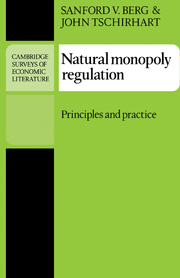Book contents
- Frontmatter
- Contents
- Preface
- 1 Introduction to regulatory economics
- Part I Optimal pricing and investment for natural monopolies
- Part II Natural monopoly regulation in practice
- 8 Regulation in practice: Why and how are firms regulated?
- 9 Models of regulatory constraints
- 10 Technological change under regulation
- 11 Partial regulation, deregulation, and diversification
- 12 Alternatives to traditional regulation
- References
- Author index
- Subject index
12 - Alternatives to traditional regulation
Published online by Cambridge University Press: 06 November 2009
- Frontmatter
- Contents
- Preface
- 1 Introduction to regulatory economics
- Part I Optimal pricing and investment for natural monopolies
- Part II Natural monopoly regulation in practice
- 8 Regulation in practice: Why and how are firms regulated?
- 9 Models of regulatory constraints
- 10 Technological change under regulation
- 11 Partial regulation, deregulation, and diversification
- 12 Alternatives to traditional regulation
- References
- Author index
- Subject index
Summary
We have examined the justification for government regulation of natural monopolies. Part I of this volume outlined the pricing principles for these monopolies that would promote economic efficiency. We also indicated a number of regulatory pricing methods whose properties deviate significantly from the efficient principles. In Part II we have seen that regulation may be rooted more in the politics of groups competing for public favors than in the goal of economic efficiency. Moreover, there have been numerous studies pointing out regulatory failures in terms of output and input inefficiencies. An obvious question, then, is whether or not there are alternatives to traditional forms of regulation that may work better. Can the inefficiencies that seem to be inherent in traditional regulation be mitigated by improving regulatory procedures? In the first four sections of this chapter, we study four categories of alternatives: (1) public ownership, (2) franchising, (3) regulating quality, and (4) incentive schemes. In the latter section, we see that the regulators' problems are even more difficult than those that have been described earlier in the book, because the information needed to do a good job of regulating usually is unavailable. Section 12.5 provides a conclusion.
Public ownership
If regulation of private natural monopolies results in inefficient production techniques and output prices, then one solution might be to socialize these monopolies: change the ownership mode from private to public. However, this proposal raises the hackles of many consumers, producers, and regulators for reasons that extend beyond the domain of economic analysis. Such an action would seem to strike at the very foundation of the free-enterprise system.
- Type
- Chapter
- Information
- Natural Monopoly RegulationPrinciples and Practice, pp. 480 - 522Publisher: Cambridge University PressPrint publication year: 1989



